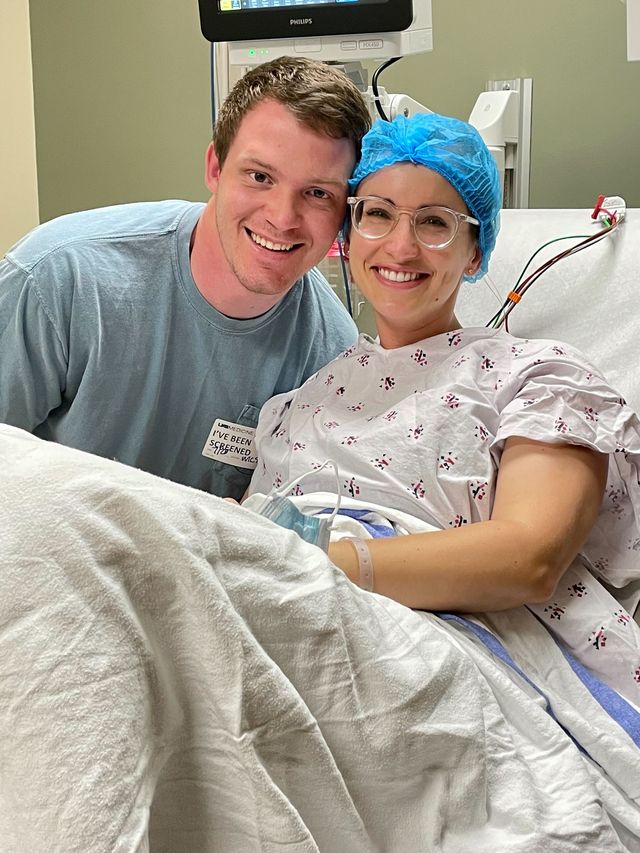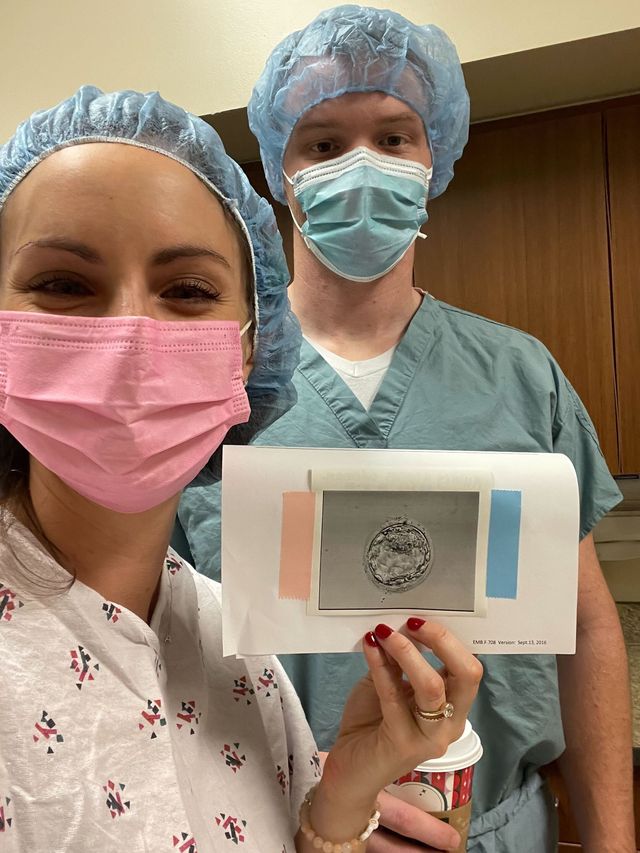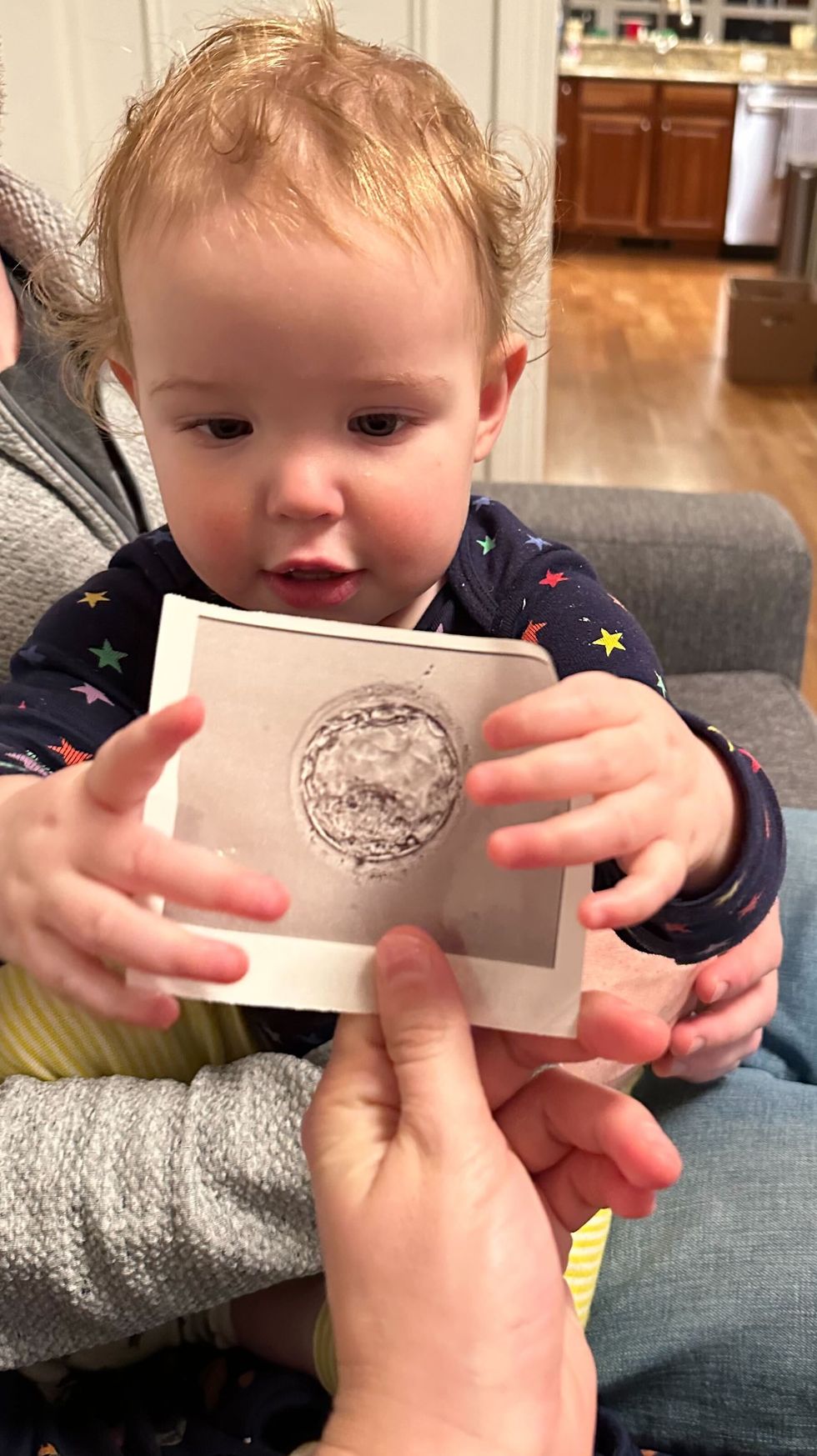Alabama Tried to Control My Frozen Embryos. What’s Going to Come Next?
When pediatrician Aubrey Coleman, 31, moved out of Alabama this past fall, she left something important behind: six frozen embryos. Coleman had gone through IVF treatment a few years prior and was able to get pregnant with her daughter, but she wanted to keep her remaining frozen embryos stored in hopes she could use them later to have more children. So when the Alabama Supreme Court ruled in late February that frozen embryos—which, throughout the IVF process, are often discarded or fail to transfer to the uterus—are humans, and state fertility clinics halted IVF procedures out of fear, Coleman panicked. At the time, Health and Human Services Secretary Xavier Becerra called the ruling “a devastating example of the chaos caused by Dobbs.”
Coleman was trying to get her embryos out of the state when, due to widespread outcry, Alabama Gov. Kay Ivey signed legislation into law protecting IVF providers, and clinics resumed treatment. But as experts have pointed out, the law doesn’t address the issue of whether embryos are considered children, and now, a majority of U.S. House Republicans are supporting similar legislation that would threaten access to IVF across the country—leaving patients like Coleman confused and uneasy about the future.“I still feel very uncomfortable with my embryos being in Alabama,” she says. Below, in her own words, Coleman shares her story.
When I saw the Alabama Supreme Court decision last month, at first, my embryos didn’t even cross my mind. I just thought, what a surprise—Alabama doing something stupid. When I was working in the state in 2023, I lived in Eufaula, the best little town where I was the only pediatrician for about 60 miles in any direction. It was a great learning experience, and the people were so wonderful. But I served a majority Medicaid population and watched so many kids grow up in poverty. So when I saw the decision, my first reaction was: Here goes Alabama caring about something they shouldn’t be, when they should actually be caring for the children who are already there. But then after a few minutes, I thought, “Well, what does this mean for our embryos?”
My husband and I first moved to Alabama in 2018 after I finished medical school, since he wanted to go back to his home state. I ended up doing my residency at Children’s of Alabama, and then we moved about three hours south of Birmingham to Eufaula. We first started trying to have a baby in February 2020, but after more than a year of exams and surgery and intrauterine insemination, we decided to move forward with IVF in July 2021. It was a long, costly, mentally taxing process. We did the egg retrieval and embryo-creation that month and were able to freeze seven embryos, but I couldn’t have my first embryo transfer until December. Thankfully, it worked, and I was able to get pregnant. Going into it, I thought, nothing has worked so far, so we can’t get our hopes up. We have more embryos frozen if we need. It was very medicalized, and I knew it might take more than one transfer.
Throughout my whole pregnancy, I was so anxious, worried that something bad was going to happen. If you go through infertility treatments, you’re always holding your breath. You want to be cautious. You want to protect your heart.
After my daughter was born, we decided to pay the yearly fee to keep our other frozen embryos stored, until we were ready to have another child. Then this past October, we moved to the Midwest, and soon after, we started to think about getting pregnant again. I reached out to the doctor who’d done my egg retrieval. I was hoping to keep the embryos there and do this process with the doctors and nurses I trust, the ones who already gave us a family. My doctor told me she’d love to do the next transfer and that we could figure out what needed to be done in Alabama and what could be done locally, and go from there.
Then the Alabama Supreme Court decision came out, and my fertility doctor told me they had to put everything involving embryos on hold. It was such a gut punch. I became so anxious and upset. I needed to figure out a plan to get my embryos out.
So I started requesting quotes from several embryo shipping companies. One company told me they could do it, and I started the initial paperwork, but then I saw a news article that they had halted transports in and out of Alabama, so I called and asked if it was true. The sweet customer service representative told me it was, and I just broke down sobbing: “But yesterday, you told me you could do it!” I was a mess. The next day I got what was surely an automated email from that same company that said: “We just wanted to see if you received our quote and if you’re still interested.” I emailed back, “How insensitive can you be?”
I told my husband that if the state was classifying these embryos as humans, I’d sue them for kidnapping, since they weren’t allowing us to get our children. But my husband’s an attorney, and his first response was: “If you’re going to do that, you need to be prepared for people to come at you for child abandonment. If they’re our kids, we moved out of state, and we left them.” How insane is it that we even had that conversation?
Once our fertility clinic opened back up, I spoke to my doctor, who said she would still try to work with me from afar, and I’d only have to travel to Alabama for absolutely necessary appointments and procedures. My health insurance doesn’t have any fertility coverage, and financially, it’s less expensive to do a transfer in Alabama. Plus, shipping my embryos would’ve been costly. So if things are okay for right now, then we’ll leave the embryos where they are.
In my opinion, the state has put a little Band-Aid on a huge, bleeding wound. They have done just enough to allow fertility treatments to restart, but can you get rid of your embryos or anything like that? Are embryos still considered people? There’s this confusion and uncertainty. I still feel very uncomfortable with my embryos being in Alabama and selfishly only want to keep them there so I can have another baby. I’m not getting any younger, and I might not get pregnant on the first transfer this time around. Every week, every month you wait, you’re just delaying the process even more. But also I understand what a privileged place I am to be even stressing about this; we paid almost $30,000 to have our daughter.
But it’s infuriating, because my husband and I signed consents when we went through the IVF process. The embryos were classified as property, and I 100 percent thought of them as such. I don’t think of these six embryos that are still frozen as people whatsoever. They have a chance to become people, but we could transfer all six, and none of them could take. In my mind, I wouldn’t then have six dead children. I wouldn’t have six death certificates.
Now, I’m just emotionally drained. I feel unsettled and uneasy about everything. Who knows what’s going to come next?
This interview has been edited and condensed for length and clarity.




